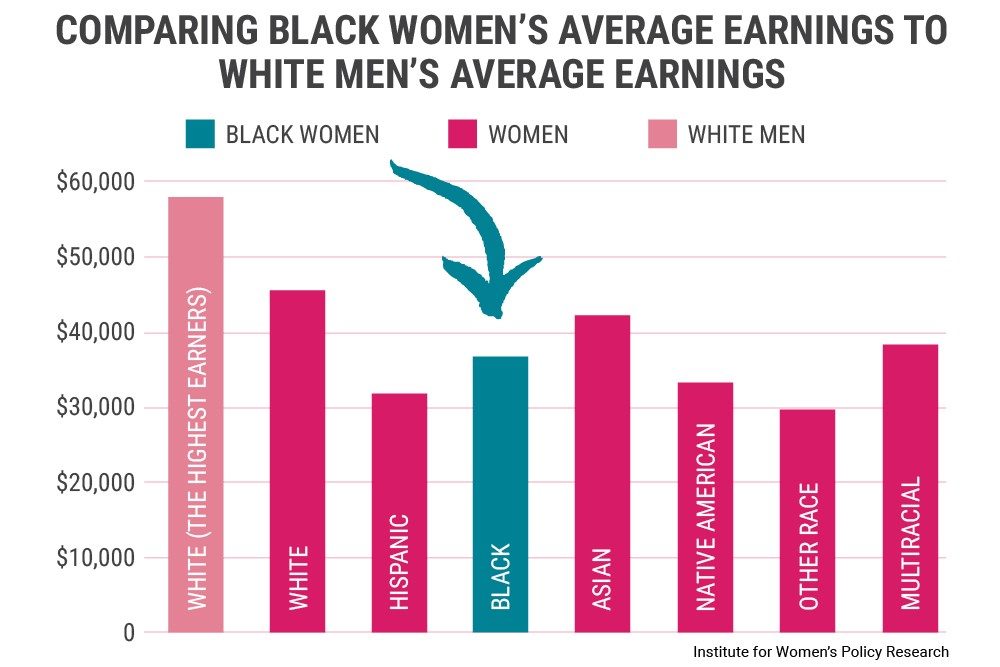
It’s Time to Pay Black Women
August 7 is African-American Women’s Equal Pay Day
Today you might have heard the phrase “pay black women” or seen #payblackwomen on social media, but what does this really mean? August 7 is African-American Women’s Equal Pay Day and it means that, on average, a black woman must work 219 days into 2018 just to earn the same salary that her white male colleagues earned in 2017.
Black women make .63 cents on the dollar when compared to white men – a dismaying gap that dwarfs the .80 cents on the dollar earned by all women when compared to all men. This all adds up: in Colorado, over a 40-year career a black woman’s lost earnings amount to $867,920.
Janelle Jones, an economic analyst at the Economic Policy Institute (EPI) who conducts research for EPI’s Program on Race, Ethnicity, and the Economy, shared insights with The Women’s Foundation of Colorado to help our supporters understand this disparity; how it affects black women, their families, and Colorado’s economy; and what we can do to pay black women fairly.
African-American women in Colorado earn 63.1 percent of what their white male counterparts earn – what does this mean for our state’s economy?
There are two ways to think about the pay gap: at the personal level and at the level of our economy. At the personal level, the work of black women is being devalued. That’s literally what the pay gap is saying with dollars and cents. It’s saying black women are not as highly valued as their white male counterparts.
When black women aren’t earning enough, they can’t put as much money back into their communities. Our economy is driven by demand. We need people to have good wages to circulate that back into the economy and drive growth. The pay gap does a disservice to black women, their families, their communities, and the economy as a whole.
Why does this pay gap exist?
EPI put out a report about the pay gap that goes through everything we can try to use to explain the pay gap… A lot of the pay gap is due to discrimination based on gender. The barriers start very early on. Women early in their careers face a pay gap that just grows. It doesn’t go away with education and promotions. We see it in occupations where women are very prominent and where women are very few.
Why is there a variance of pay for African-American women?
It goes back to the history of black women working in this country. It started with women not being paid at all. Black women working as caretakers and servants weren’t paid. Later, when social security was created, there were specific federal policies that excluded domestic women from participating in social security. Black women filled many of these positions as domestic workers. Now, one of the top occupations for black women is as a home health aide. This is low-wage work and there are very low labor protections in the field. Essentially, the labor market sets up industries to be dominated by women of color and those occupations and industries are devalued.
In addition to the lost income, what does this inequity in earnings amount to over a black woman’s lifetime?
It’s important to note that the pay gap is not an individual’s fault. We know from the data that’s simply not true. Black women across the labor market, across occupations, and across geographies see a gap in pay. We can control for education, years of experience, and the work being done, and there’s still a huge gap between the earnings of black women and white men.
We can control for education, years of experience, and the work being done, and there’s still a huge gap between the earnings of black women and white men.
On a day-to-day level, women feel degraded and devalued. They have less financial security – and research shows financial security connects to mental health, to parenting, to every aspect of life. Financial security is important for having a full and whole life. The pay gap is about economics, and it’s also about something larger than that.
These impacts multiply over a person’s lifetime. The wage gap contributes to the wealth gap. If you’re not able to save because of low wages, that has implications for how you’re able to support your family going forward. You’re living paycheck to paycheck, you can’t pay for college for your kids, can’t be prepared for a medical emergency or if you need car repairs. There’s no economic security. It’s devastating that so many people can’t prepare for any sort of unplanned financial burden.
How does this pay gap within the gender pay gap affect the next generation?
Overall, the gender gap has been closing. But last year, African-American Women’s Equal Pay day was on July 31. This year, it’s in August, meaning that it’s taking longer for black women to catch up. It lowers the bar so much on different levels. Many women of color have lowered their expectations. Some Black women just want to be paid as well as white women. That shouldn’t be the goal. We should be working to close the pay gap with white men. Low expectations also hurt whole occupations. People think of home health aides — important jobs that have to do with life and death — as jobs that are just never expected to pay a living wage and give a good quality of life. It’s terrible that we accept that.
What barriers need to be dismantled to pay black women fairly?
People don’t really know they’re being underpaid. Pay transparency is an important way to open people’s eyes to recognizing and acknowledge that there is a gap. Then they can do something about it.
At EPI, we discuss the way unions affect the pay gap for all women and particularly women of color. Women of color in a union do much better with wages than women who are not in unions. Promoting and protecting unions is important.
In food service and retail jobs, some workers experience wage theft, which literally takes money away from women who are already underpaid. Enforcing laws against wage theft helps black women keep wages they’ve earned.
Raising the minimum wage helps all workers, and especially black women, because black women and other women of color are very often working in minimum wage positions.
What actions can Coloradans take to advance pay equity for black women?
The first thing is finding out what’s going on in your workplace. We, as a think tank, give a lot of depressing information to the public – and sometimes people take that as overwhelming and think they can’t do anything. But you can be more knowledgeable about what’s going on and add your voice and support. You can find out if women of color are being underpaid. If you are manager – take a look at the pay of your employees. Have an open conversation about pay transparency. It’s impossible to find a solution to the problem if you don’t know the scale of it.
See if your locality has equal pay legislation that it’s considering, and see if you can be involved and support it.
Coming together is also important. People sometimes think of the pay gap as a women of color problem and think, “It’s not my problem,” which isn’t the case. Equal Pay Day for Native American Women is in November, and it’s in September for Latinas. It’s key that women of color come together along with allies standing with them to take action and raise awareness.
Today on social media, please use #payblackwomen to raise awareness of African-American Women’s Equal Pay Day.
The Women’s Foundation of Colorado is a nonpartisan organization. The opinions of guest bloggers are their own and do not necessarily reflect the opinions or positions of The Foundation.

